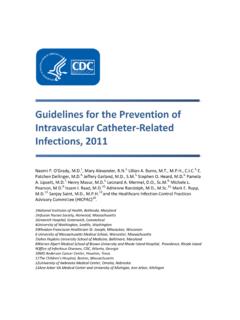Transcription of THE BELMONT REPORT: ETHICAL PRINCIPLES AND …
1 The BELMONT report ETHICAL PRINCIPLES and Guidelines for the Protection of Human Subjects of Research The National Commission for the Protection of Human Subjects of Biomedical and Behavioral Research DHEW Publication No. (OS) 78-0012 For sale by the Superintendent of Documents, Government Printing Office, Washington, 20402 National Commission for the Protection of Human Subjects of Biomedical and Behavioral Research Westwood Building, Room 125 5333 Westbard Avenue Bethesda, Maryland 20016 September 30, 1978 Honorable Joseph A. Califano, Jr. Secretary of Health, Education, and Welfare Washington, 20201 Dear Mr.
2 Secretary: On behalf of the National Commission for the Protection of Human Subjects of Biomedical and Behavioral Research, I am pleased to trans- mit our " BELMONT report : ETHICAL PRINCIPLES and Guidelines for the Protection of Human Subjects of Research." The identification of basic ETHICAL PRINCIPLES that should underlie the conduct of research involving human subjects, and the development of guidelines to assure that such PRINCIPLES are followed, were topics of studies set forth in the Com- mission's mandate under Public Law 93-348. This mandate also directs the Commission to submit its report to the President, the Congress, and the Secretary of Health, Education, and Welfare.
3 Unlike most of the previous reports of the Commission, the BELMONT report does not make specific recommendations for admin- istrative actions by the Secretary of Health, Education, and Welfare. Instead, it is our recommendation that the BELMONT report be adopted in its entirety as a statement of departmental policy on the conduct of research involving human subjects. Publication and dissemination of this policy will provide federal employees, members of Institutional Review Boards and scientific investigators with common points of reference for the analysis of ETHICAL issues in human experimentation.
4 While the PRINCIPLES cannot always be applied so as to resolve beyond dispute particular ETHICAL problems, they provide an analytical frame- work that will guide the resolution of ETHICAL problems arising from research involving human subjects. The BELMONT report is the outgrowth of an intensive four-day period of discussions that were held in February 1976 at the Smithsonian Insti- tution's BELMONT Conference Center and the monthly Commission's deliberations that have been conducted over the nearly four years of our existence. We appreciate the opportunity to have worked on this fundamental task in the protection of human research subjects.
5 Respectfully, Kenneth J. Ryan, Chairman NATIONAL COMMISSION FOR THE PROTECTION OF HUMAN SUBJECTS OF BIOMEDICAL AND BEHAVIORAL RESEARCH MEMBERS OF THE COMMISSION Kenneth john Ryan, , Chairman Chief of Staff Boston Hospital for Women Joseph V. Brady, Professor of Behavioral Biology Johns hopkins University Robert E. Cooke, President Medical College of Pennsylvania Dorothy I. Height President National Council of Negro Women, Inc. Albert R. Jonsen, Associate Professor of Bioethics University of California at San Francisco Patricia King, Associate Professor of Law Georgetown University Law Center Karen Lebacqz, Associate Professor of Christian Ethics Pacific School of Religion * David W.
6 Louisell, Professor of Law University of California at Berkeley Donald W. Seldin, Professor and Chairman Department of Internal Medicine University of Texas at Dallas Eliot Stellar, Provost of the University and Professor of Physiological Psychology University of Pennsylvania * Robert H. Turtle, Attorney VomBaur, Coburn, Simmons & Turtle Washington, * Deceased NATIONAL COMMISSION FOR THE PROTECTION OF HUMAN SUBJECTS OF BIOMEDICAL AND BEHAVIORAL RESEARCH COMMISSION STAFF PROFESSIONAL STAFF Michael S. Yesley, Staff Director Barbara Mishkin, Assistant Staff Director Duane Alexander, Pediatrics Tom L.
7 Beauchamp, Philosophy Bradford H. Gray, Sociology Miriam Kelty, Psychology Betsy Singer Public Information Officer Dorle Vawter Research Assistant SUPPORT STAFF Pamela L. Driscoll Marie D. Madigan Coral M. Nydegger Erma L. Pender SPECIAL CONSULTANTS Robert J. Levine, Stephen Toulmin, TABLE OF CONTENTS A. Boundaries Between Practice and Research.. 2 B. Basic ETHICAL PRINCIPLES .. 4 1. Respect for Persons .. 4 2. Beneficence .. 6 3. Justice .. 8 C. Applications .. 10 1. Informed Consent .. 10 2. Assessment of Risks and Benefits .. 14 3. Selection of Subjects .. 18 BELMONT report ETHICAL PRINCIPLES AND GUIDELINES FOR RESEARCH INVOLVING HUMAN SUBJECTS Scientific research has produced substantial social benefits.
8 It has al so posed some troubling ETHICAL questions. Public attention was drawn to these questions by reported abuses of human subjects in biomedical ex- periments, especially during the Second World War. During the Nuremberg War Crimes Trials, the Nuremberg Code was drafted as a set of standards for judging physicians and scientists who had conducted biomedical experiments on concentration camp prisoners. This code became the prototype of many later codes* intended to assure that research involving human subjects would be carried out in an ETHICAL manner. The codes consist of rules, some general, others specific, that guide the investigators or the reviewers of research in their work.
9 Such rules often are inadequate to cover complex situations; at times they come into conflict, and they are frequently difficult to interpret or apply. Broader ETHICAL PRINCIPLES will provide a basis on which specific rules may be for- mulated, criticized and interpreted. Three PRINCIPLES , or general prescriptive judgments, that are relevant to research involving human subjects are identified in this statement. * Since 1945, various codes for the proper and responsible conduct of human experimentation in medical research have been adopted by different organ- izations. The best known of these codes are the Nuremberg Code of 1947, the Helsinki Declaration of 1964 (revised in 1975), and the 1971 Guide- lines (codified into Federal Regulations in 1974) issued by the De- partment of Health, Education, and Welfare.
10 Codes for the conduct of social and behavioral research have also been adopted, the best known being that of the American Psychological Association, published in 1973. 1 Other PRINCIPLES may also be relevant. These three are comprehensive, how- ever, and are stated at a level of generalization that should assist scientists, subjects, reviewers and interested citizens to understand the ETHICAL issues inherent in research involving human subjects. These PRINCIPLES cannot always be applied so as to resolve beyond dispute particular ETHICAL problems. The objective is to provide an analytical framework that will guide the resolution of ETHICAL problems arising from research involving human subjects.






